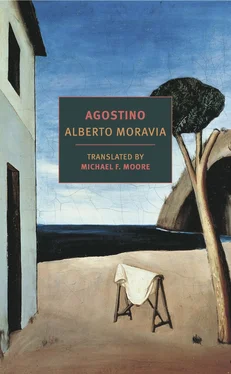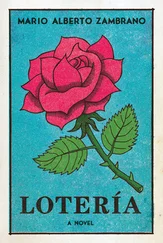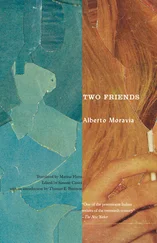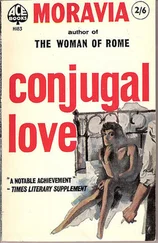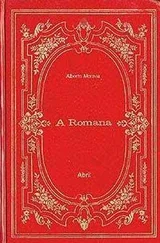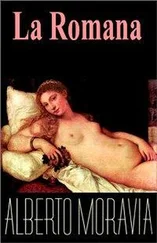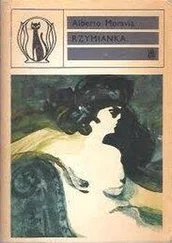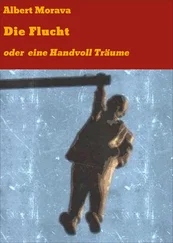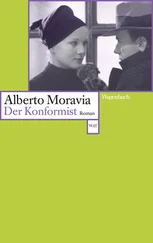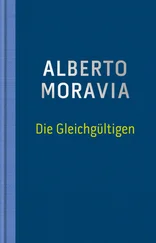“But I—” Agostino started to say, not trusting Tortima.
“Are you going to give it to me or not?” Tortima insisted with brutality. Embarrassed that it was all in small change, Agostino obeyed him and emptied his pockets into his companion’s hands. “Now keep quiet and follow me,” Tortima said.
As they approached the house, the shadows grew softer, and the two gateposts, the driveway, and the doorway beneath the awning came into view. The gate was ajar. Tortima gave it a push and entered the yard. The door was also open a crack. Tortima climbed the steps and after making a gesture to Agostino to keep quiet, he went in. Before Agostino’s curious eyes appeared a small, completely bare entry-way, at the far end of which a double door with red and blue windowpanes glowed in the bright light. Their entrance had set off a loud buzzer, and almost immediately a massive shadow, like a seated person standing, was projected behind the glass and a woman appeared in the doorway. She was some sort of maid, corpulent and older, with a large bosom clothed in black and a white apron tied around her waist. She came out belly-first, with her arms to her sides and a bloated, grumpy, suspicious face beneath a knot of hair. “Here we are,” said Tortima. From his voice and demeanor, Agostino could tell that Tortima, usually so bold, was also intimidated.
The woman gave them a long hard look, and then, in silence, beckoned to Tortima as if to invite him in. Tortima smiled, relieved, and hurried toward the glass-paned door. Agostino started to follow. “Not you,” said the woman, stopping him with a hand on his shoulder.
“What do you mean?” asked Agostino, suddenly losing his timidity. “He can and I can’t?”
“I really shouldn’t let either of you in,” said the woman, staring at him, “but he gets in. You don’t.”
“You’re too little, Pisa,” said Tortima mockingly. And with a push through the double door he disappeared. His squat shadow appeared for a second behind the glass; then it vanished into the bright light.
“But I—” Agostino insisted, exasperated by Tortima’s treachery.
“Get out of here, little boy. Go home,” said the woman. She went to the door, opened it, and found herself face-to-face with two men on their way in. “Good evening, good evening,” said the first, a man with a ruddy, jovial face. “We have an agreement, right?” he added, turning to his companion, a pale thin blond. “If Pina is free, she’s mine. I mean it.”
“Agreed.”
“What does this kid want?” asked the jovial man, pointing at Agostino.
“He wanted to get in,” said the woman. A fawning smile was outlined on her lips.
“You wanted to get in?” the man shouted at Agostino. “You wanted to get in? At your age you should be home this hour of the night. Go home, go home,” he shouted, waving his arms.
“That’s what I told him,” the woman replied.
“And if we let him in?” remarked the blond man. “At his age I was already making love to the maid.”
“Who do you think you’re fooling? Go home, go home!” shouted the man, infuriated. “Go home!” With the blond man right behind him, he burst through the door, slamming it behind him. Before he knew what had happened, Agostino found himself outside in the yard.
Everything had ended badly, he thought. Tortima had cheated him, taking the money, and he himself had been kicked out. Not knowing what to do, he walked backwards down the driveway, gazing at the half-open door, the awning, the front of the house rising before him with its white shutters closed tight. He felt a searing sense of disappointment, especially because of the way the two men had treated him, like a child. He found the jovial man’s shouting and the blond’s cold tentative kindness no less humiliating than the matron’s blunt, expressionless hostility. Still walking backward, looking around and peering at the trees and bushes in the dark yard, he headed toward the gate. But he suddenly noticed that one whole part of the garden, on the left side of the house, appeared to be illuminated by a bright light that seemed to emanate from an open window on the ground floor. It occurred to him that through the window he would at least be able to get a glimpse of the house. Trying to make as little noise as possible, he worked his way toward the light.
As he imagined, it was a ground-floor window, wide open. The windowsill wasn’t very high. Slowly but surely, hewing close to the corner where it was less likely he would be seen, he approached the window and peered inside.
The room was small and brightly lit. The walls were papered with a gaudy floral pattern in green and black. Opposite the window, a red curtain, hanging by wooden rings from a brass rod, seemed to conceal a door. There was no furniture. Someone was sitting in a corner, on the window side. All you could see were his crossed feet in yellow shoes extended almost to the middle of the room: the feet, Agostino thought, of a man comfortably settled in an armchair. Disappointed, he was about to withdraw when the curtain was lifted and a woman appeared.
She was wearing a loose sheer sky-blue gown that reminded Agostino of his mother’s negligees. The gown, transparent, reached all the way down to her feet. Beneath the sheer material, the woman’s limbs, which took on the aquamarine tint of the fabric, appeared pale and long, almost swaying in lazy curves around the dark stain of her pelvis. Her gown, in a bizarre detail that impressed Agostino, parted over her chest in an oval neckline that dipped all the way down to her waist. Her breasts, which were round and heavy, protruded almost painfully, naked and tightly squeezed against each other. Her gown, which surrounded her breasts with a tightly pleated frame, then reconnected at the neck. Her wavy brown hair was loose and tumbled to her shoulders. She had a wide face, flat and pale, like a spoiled child, and a whimsical expression in her weary eyes and on the pursed lips of her painted mouth. With her hands behind her back and her breasts out, she emerged through the curtain and for a long moment, in an expectant pose, she stood straight and still, without saying a word. She seemed to be looking toward the corner at the man whose crossed feet could be seen in the middle of the room. Then, in the same silence with which she had come, she turned around, lifted the curtain, and disappeared. Almost immediately the man’s feet retreated from Agostino’s view. There was the sound of someone standing up. Frightened, Agostino drew away from the window.
He returned to the driveway, gave a shove to the gate, and went out into the piazza. He was feeling a strong sense of disappointment over his failed venture. At the same time he was gripped almost by terror at what awaited him in the days to come. Nothing had happened, he thought. He hadn’t been able to possess a single woman. Tortima had taken his money, and the next day the teasing of the boys and the impure torment of his relations with his mother would resume. It’s true that for a moment he had seen the woman he desired, standing in her sheer gown, her breasts naked. But he had a dark sense that this inadequate and ambiguous image would be the only picture of womanhood to accompany his memories for long years to come. In fact, years and years would go by, empty and unhappy, between him and the liberating experience. Not until he was as old as Tortima, he thought, would he be released once and for all from this awkward age of transition. But in the meantime he had to continue living in the same way. He felt his whole spirit rebel against the thought, like the bitter sense of a final impossibility.
Once he reached home, he entered without making a sound. In the doorway he saw the guest’s suitcases and heard voices in the living room. Then he climbed the stairs and went to throw himself on the cot in his mother’s bedroom. There, in the dark, angrily tearing off his clothes and tossing them on the ground, he got undressed and slipped under the sheets. Then he waited, his eyes wide open in the blackness.
Читать дальше
